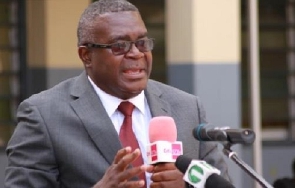 Former Director of the Ghana Education Service (GES), Charles Aheto-Tsegah
Former Director of the Ghana Education Service (GES), Charles Aheto-Tsegah
Former Director of the Ghana Education Service (GES), Charles Aheto-Tsegah, has weighed in on the contentious debate surrounding religious freedoms in mission schools, stating that clear regulations must be established to address how such institutions handle the rights of students from different religious backgrounds.
Speaking on GHOne TV, he stressed the need for a nuanced approach, particularly for mission schools operating as public institutions.
“In fact, I would say, without any fear of contradiction, that we haven’t actually drawn up various set regulations for how mission schools should conduct themselves in relation to other people who are not members of their faith,” he said.
Aheto-Tsegah explained that mission schools, while rooted in religious doctrine, must balance their values with inclusivity when they transition into public or quasi-public institutions. “Once you are a public religious institute, then you become quasi-public, and for that matter, everybody has access to that institution. They should be treated on the basis that the government is very blind to distinctions in terms of how people are treated religiously,” he remarked.
The former GES director also addressed the ongoing legal action by the Coalition of Muslim Organizations, Ghana (COMOG), regarding allegations that Wesley Girls’ High School restricts Muslim students from practising their faith. He noted that COMOG has the right to seek redress in court but questioned the relevance of revisiting what he described as an “old case” that had already been resolved amicably.
“If it’s on the basis of the old story, then I think that COMOG should not even have gone to court,” he said. “But if other things have emerged subsequently, then they must present all dimensions of the case.”
Aheto-Tsegah emphasized that mission schools have historically accommodated students from diverse religious backgrounds, citing examples like Ahmadiyya schools, which allow Christian students to practice their faith without issue.
Addressing students and parents who feel slighted by religious practices in mission schools, Aheto-Tsegah advocated for pragmatism. He encouraged them to consider transferring to schools more aligned with their religious beliefs if the mission school’s policies pose a challenge.
“If you think that the rules and the standards of the school do not adhere to the way you want to worship, you have the freedom to go to another school,” he stated.
He added that respecting the values of mission schools does not necessarily undermine an individual’s faith. “I don’t think you lose any faith if you’re a Muslim and you go into a school which goes to church… You don’t need to worship in a place which is non-denominational to maintain your beliefs.”
Aheto-Tsegah concluded by urging education stakeholders to draft comprehensive regulations for mission schools, ensuring that the rights of students from different faiths are respected while preserving the schools’ foundational values.
You can also watch videos from the meeting of Mahama and Akufo-Addo ahead of the inauguration of the joint transition team: